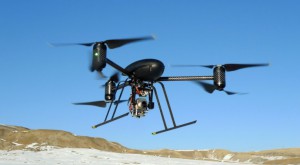Drones and Privacy Law
The word “drones” has taken on several different meanings in American culture. They have become a common phenomenon at outdoor festivals and public gatherings. The Obama administration has used them for targeted strikes in foreign countries. They were recently one of the most popular gifts this past Christmas. Real estate agents, indie filmmakers, and other professionals utilize them for their businesses. Finally, drones can be used by Peeping Toms to spy on their neighbors.
This last use has many people concerned. An invasion of privacy is the intrusion on a person’s right to be alone, and most US citizens have concerns about any form of unwarranted privacy invasion.
There have already been several reports of individuals shooting down their neighbor’s drones because they appeared to be hovering and recording private conversations. In Los Angeles, a marketing company even tried to use drones to capture cellular location data. A call for privacy regulations on drones, regardless if they are used for commercial purposes or not, seems inevitable.
Federal Laws on Drones
Currently, there are no federal laws regulating the use of drones and privacy. The Federal Aviation Administration (FAA) recently imposed some regulations as to the drones’ use in general. For example, drone pilots can no longer fly drones out of sight range. Users are also now required to register their drones with the FAA. Drones are also only permitted during daylight; night flights are no longer allowed.
Businesses are trying to persuade the FAA to change these regulations for specific commercial uses. The regulation regarding line of sight for the pilot in particular would make a business based on drone use very difficult. For example, Amazon, which was interested in using drones to delivery packages to customers, would not be able to deploy this service for anyone outside of a very small radius. 
But even with all of these regulations, the FAA acknowledges that they had no intention of drafting regulation for privacy and possible First Amendment protections. Instead, they chose to relegate the task of developing a privacy policy to the permitted test sites scattered throughout the United States. These test sites are predominantly found at research centers and university campuses. The FAA has now made it the sites’ responsibility to determine how they will handle any data they collect.
State Regulations on Drones
This doesn’t answer the questions about privacy for the rest of the United States. Since there are no federal regulations, many states have chosen to enact their own laws regarding the use of drones and privacy. In 2015, 45 states considered bills about drone regulation, 20 states passed legislation about drones, and 5 states adopted resolutions related to drones. However, these laws run the gamut and are extremely varied, from making recordings of private conversations without permission illegal, to making the use of drones during hunting illegal.
Other Constitutional Concerns
The Fourth Amendment and its case law delineates what is considered a reasonable expectation of privacy for lawful searches and seizures. Currently, if law enforcement were to fly a helicopter in public airspace and found illegal activity such as a marijuana grow in your backyard, this observation is not beyond a person’s reasonable expectation of privacy. Given current drone technology, so long as they fly in public airspace (which they are required to do by the FAA), then anything they record for law enforcement may also fall under the same reasoning.
In contrast, many journalists have concerns that heavy regulations placed on where drones can record video can infringe on their First Amendment rights. Journalists and other media news outlets want to use drones to fly into areas to record news events live, such as building fires and other dangerous situations. However, some journalists, such as paparazzi, would like to use drones to record videos of celebrities.
In California, the recording of a private conversation without permission is illegal, and is reiterated in laws specifically geared toward the use of drones. Has the appropriate balance been struck between the use of drones by the media for news reporting and the invasion of privacy?
The Future of Drones in Privacy Law
Since states have drafted drone privacy laws to cover the major concerns of a particular region, this leaves major holes in privacy regulation that vary from state to state. Some privacy advocates are demanding some standard federal regulations for basic coverage of privacy fundamentals. This would ensure that there is at least a basic set of rules that all states can agree upon and can restrict further if they choose.
However, other privacy advocates argue that there is a high risk that free speech be impinged upon if federal law isn’t drafted properly. These advocates argue that we should instead wait to see what state laws pass Constitutional muster and actually improve privacy regulation first. Once relatively successful laws are found via the states, then the federal government can draft legislation that is proven Constitutional.


Comments